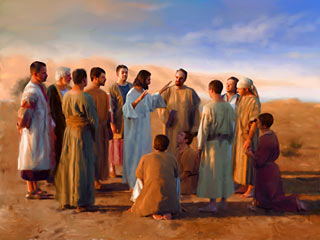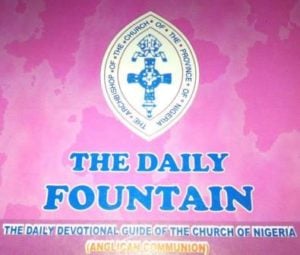Liturgical Readings for : Sunday, 7th April, 2024
Second Sunday of Easter

(also designated: Divine Mercy Sunday)
The struggle for faith experienced by Thomas leads us to think on the meaning of faith in the risen Christ.
We do not depend on physical experience of Christ but know his presence
in keeping God’s commandments and as a gathered community,
in the hearing of the word and in sacramental signs.
So the Christian community is a thankful one, always blessing God for a sure hope through the Resurrection of Christ.
FIRST READING
A reading from the Book Acts of the Apostles 4:32-35
United, heart and soul.

The whole group of believers was united, heart and soul; no one claimed for his own use anything that he had, as everything they owned was held in common. The apostles continued to testify to the resurrection of the Lord Jesus with great power, and they were all given great respect.
None of their members was ever in want, as all those who owned land or houses would sell them, and bring the money from them, to present it to the apostles; it was then distributed to any members who might be in need.
The Word of the Lord. Thanks be to God
Responsorial Psalm Ps 117
Response Give thanks to the Lord for he is good, for his love has no end.
or Alleluia, alleluia, alleluia!
1. Let the sons of Israel say: ‘His love has no end.’
Let the sons of Aaron say: ‘His love has no end.’
Let those who fear the Lord say: ‘His love has no end.’ Response
2. The Lord’s right hand has triumphed; his right hand raised me up.
I shall not die, I shall live and recount his deeds.
I was punished, I was punished by the Lord, but not doomed to die. Response
3. The stone which the builders rejected has become the corner stone.
This is the work of the Lord, a marvel in our eyes.
This day was made by the Lord; we rejoice and are glad. Response
SECOND READING
A reading from the first letter of St John 5:1-6
Anyone who has been begotten by God has already overcome the world.

Whoever believes that Jesus is the Christ has been begotten by God;
and whoever loves the Father that begot him loves the child whom he begets.
We can be sure that we love God’s children if we love God himself and do what he has commanded us;
this is what loving God is –
keeping his commandments; and his commandments are not difficult,
because anyone who has been begotten by God has already overcome the world;
this is the victory over the world – our faith.
Who can overcome the world? Only the man who believes that Jesus is the Son of God;
Jesus Christ who came by water and blood, not with water only,
but with water and blood; with the Spirit as another witness –since the Spirit is the truth.
The Word of the Lord. Thanks be to God
Gospel Acclamation Jn 20: 29
Alleluia, alleluia!
Jesus said to him: ‘You believe because you can see me.
Happy are those who have not seen and yet believe.’
Alleluia!
GOSPEL
The Lord be with you And with your spirit.
A reading from the holy Gospel according to John 20:19-31 Glory to you, O Lord
Eight days later, Jesus came.
In the evening of that same day, the first day of the week, the doors were closed in the room where the disciples were, for fear of the Jews. Jesus came and stood among them. He said to them, ‘Peace be with you,’ and showed them his hands and his side.
The disciples were filled with joy when they saw the Lord, and he said to them again,
‘Peace be with you. ‘As the Father sent me, so am I sending you,’
After saying this he breathed on them and said:
‘Receive the Holy Spirit. For those whose sins you forgive, they are forgiven; for those whose sins you retain, they are retained.’

Thomas, called the Twin, who was one of the Twelve, was not with them when Jesus came.
When the disciples said, ‘We have seen the Lord,’
he answered, ‘Unless I see the holes that the nails made in his hands and can put my finger into the holes they made, and unless I can put my hand into his side, I refuse to believe.’
Eight days later the disciples were in the house again and Thomas was with them.
The doors were closed, but Jesus came in and stood among them. ‘Peace be with you,‘ he said.
Then he spoke to Thomas, ‘Put your finger here; look, here are my hands.
Give me your hand; put it into my side. Doubt no longer but believe.‘
Thomas replied, ‘My Lord and my God!‘
Jesus said to him: ‘You believe because you can see me. Happy are those who have not seen and yet believe.’
There were many other signs that Jesus worked and the disciples saw, but they are not recorded in this book. These are recorded so that you may believe that Jesus is the Christ, the Son of God, and that believing this you may have life through his name.
The Gospel of the Lord. Praise to you, Lord Jesus Christ.
*****************************
Introduction to the Celebration

Last Sunday we cried out with joy that ‘Today Christ is risen! Christ has conquered evil and death.‘
This theme is so central for us that we need an extended time to ponder the day of resurrection: so here we are again today thinking about the day he rose. Easter day is the day he told us that our sins were forgiven, it is the day he charged us to be forgiving. On Easter day he gave us new life, and charged us to be life-giving. So as we stand here celebrating resurrection, how do we stand in our lives as people claiming this belief?
Homily Notes
1. Only one of the three elements in this gospel passage can be explored in the homily: to try to do more is to risk confusion and overload. I have chosen the image of the risen Christ who appears among his followers with the greeting: ‘Peace be with you‘, and who follows this up with a sending out of the disciples to be bearers of peace and reconciliation.
2. Forgiveness, peace-making, and reconciliation are not concepts that we run together in our minds nor automatically link to our identity as Christian, yet they are at the heart of the meaning of resurrection. Let us note how we tend to react to these themes.
3. Forgiveness brings to mind a very individualist notion of getting rid of that which hinders me from getting to where I want to go: heaven. Forgiveness can be seen as a kind of sacred selfishness or a personal escape hatch from doom. Seeking forgiveness can then become an introverted process of reducing the mystery of God’s love into my desire ‘to get off the hook’.

4. Reconciliation and peacemaking seem to be sideline issues for most Christians: one more good work that you might engage in if that is your ‘thing‘. Having a conscious attitude of seeking to overcome division or taking a positive stance towards the question of peace can be seen to be areas where some Christians might feel they have a role, but that these could not be said to be defining issues for Christians. Many First World Christians might even go so far as to say that even if one were uninterested in the building-up of a society of peace one could still call oneself a Christian and a believer in resurrection.
5. When we hear of ‘forgiving and retaining sins‘ we think first of the priest in the confessional in the highly structured environment of the sacrament. The notion of ‘retained sins’ brings to mind many negative images of being frightened in the confessional and ‘the church’ wielding spiritual ‘power’. This command is therefore primarily a commissioning ceremony of giving out power and authorisation to the apostles and their successors. This range of ideas, limiting forgiveness to a specific sacramental moment often with negative echoes, can seriously impair our seeing the larger significance of this part of Christ’s resurrection message.

6. To be a Christian is to be one who is forgiven, and so one who forgives. ‘Forgive us our trespasses as we forgive those who trespass against us.‘ This forgiveness is declared to us in the Father raising Christ from death: death and destruction are not to have the final say in human life. This forgiveness and victory are shared with us in Christ’s gift of the Spirit. We are a people who, far from being cut-off from God, have God dwelling within us.
7. This people of the resurrection is then commanded to share this forgiveness and peace in their actions: it is the acceptance of this divine programme that constitutes real belief in resurrection. So the followers are constituted as a group who have a task to fulfil for the whole world: they must be the bearers of forgiveness. It they carry out this task then peace and for King). This is a ministry that Christ sends us out into the world to perform as his agents. It is a ministry not in some restricted sense of a job or function in the church’s administration or liturgy, nor in a special sense of a sacred encounter with a sacred minister (priest), but in the fundamental sense of a service performed to a suffering humanity. The risen Christ looks with love on all who suffer and are in bondage in one way or another, and sends us to bring peace and freedom. This is a central task of us Christians as a group and of each of us. It should be that to know there are Christians is to know that there are people who go around working for peace and proclaiming that God is forgiving.
8. Even in the case of the specific instance of forgiveness we call the Sacrament of Reconciliation we express the belief that the basic mission to forgive and reconcile belongs to the whole group: ‘… the Father of mercies, through the death and resurrection of the Son … sent the Spirit … for the forgiveness of sins … through the ministry of the church (the sacramental formula of absolution).
9. However, knowing that peace-making and reconciliation is central to our role as Christians and our witness as a group is one thing, moving beyond this is something else again. The temptation is to harangue and preach: we must be reconciling! we must be peace-making! we must condemn violence and the cries go on and on. But such harangues make little difference in practice. Perhaps it is more useful to become aware of the complexity of our situation.
First, we all are in favour of peace and goodness and reconciliation — it is almost axiomatic, like saying ‘humans want to be happy.‘
But, second, while this is what we claim to want, most of us have vested interests in strife in some shape or form: be it in relationships, in the way we earn a living, in our national pride, or in more obviously exploitational activities. We want peace but only in so far as it is equivalent to our victory or at the very least only in so far as our own apple cart is not upset.
Third, we must be aware of how precious our own positions are to us and how we dread having to change our minds or lifestyles. This change is painful and cuts deep. Peace making is only easy for those with no stake in the present situation.
Finally, we must note that we as Christians have an abysmal track-record regarding peace. Hence it is all too easy to root around in Christian tradition and find justification for any type of intolerance and this makes the whole notion of peacemaking seem less urgent. Memories can be the great authorisation of strife and hatred, and to challenge some long-championed position in theology, politics, business, relationship, or social customs can seem both treacherous and foolhardy.
10. It is in this personal analysis of the contrast between, on the one hand, how big a stake so many of us have in violence, strife, struggle, and a culture of death, with, on the other hand, the command to forgive and make peace, that we individually discover the cost of believing in Christ as the conqueror of death. To even start the examination of this cost of discipleship in our lives is the first victory of peace. Do not ask ‘Do I believe in the resurrection? — that can be a cosy religious word-game; but ask: Am I prepared to take the discomfiture, loss of pride, or perhaps loss of income that comes with working for peace, development, and reconciliation (cf ‘development [of the Third World] is another name for peace,’ Paul VI in Populorum progressio)? Peace-making is never soppy, usually costly, and rarely easy.
***********************************
Sean Goan
Let the reader understand
Gospel John 20: 19-31
In this very packed Gospel, different facets of the Easter mystery are presented. Firstly we note that Jesus appears to the community gathered on a Sunday, they rejoice at his presence and receive through him the gift of the Holy Spirit and with this are given a mission, they are sent just as Jesus himself was. In these verses we have as good a summary of what Sunday Eucharist is all about as we will ever find. In short, it is about joy in the presence of the Risen Lord who give us his peace so that we can continue his task of revealing God to the world. Thankfully Thomas is missing because his refusal to believe means that the following Sunday we need to gather again and once again as a community of faith encounter Christ among us. Now, by a wonderful irony, it is Thomas who leads us in our appropriate response as we acknowledge Jesus as ‘Our Lord and Our God‘. The words addressed to Thomas by Jesus are for the generations of Christians who have continued to proclaim the Easter message ever since: ‘Blessed are those who have not seen and yet believe.‘
Reflection

Today’s readings originated with different communities at different times in the life of the early church but there is a striking similarity in their insistence that believing in the resurrection heralds a change in the way we live. We simply cannot be true believers if we close our hearts to those in need around us. If we accept the risen Christ and the promise of new life that he brings then we must be engaged in bringing about the kingdom of God. It is not characterised by a private piety but by an inclusive love which reaches out to those who are most in need. Today’s gospel gives us John’s Pentecost and reminds us that all that we would do in the name of Jesus is to be done in the power of the Holy Spirit.
**********************************
Taken from THE JERUSALEM BIBLE, published and copyright 1966 by Darton, Longman and Todd Ltd












